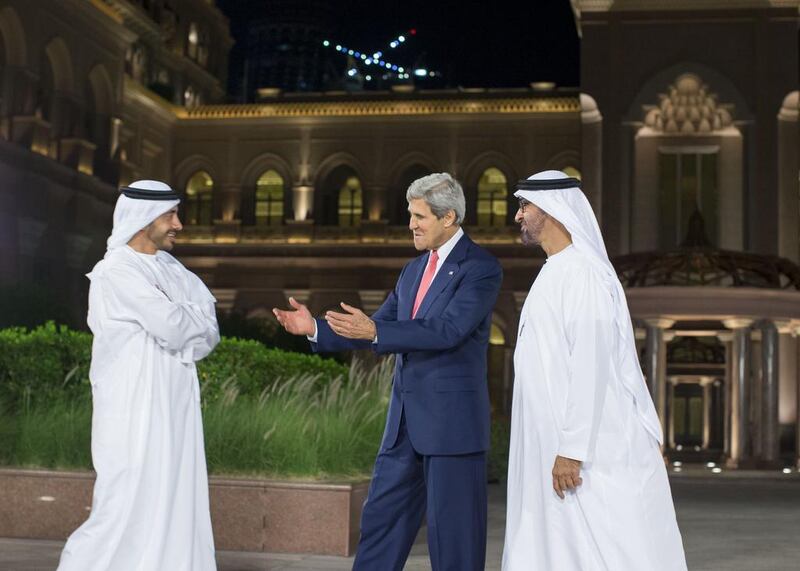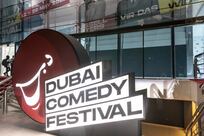ABU DHABI // No nuclear deal ever reached with Iran will threaten the UAE's relationship with Washington, the US secretary of state John Kerry pledged yesterday.
Mr Kerry applauded the UAE’s economic sacrifices in supporting sanctions against Iran amid international concern over its nuclear programme.
"We know that the UAE and others have paid a great price … from some $23 billion in business down to $4 billion. That's a huge sacrifice so we have real partners in the UAE with respect to the sanctions," he said after talks in Abu Dhabi with the Minister of Foreign Affairs, Sheikh Abdullah bin Zayed.
Sheikh Abdullah said it was important for the US administration to push the process forward.
"We are comfortable with the size and speed of the consultation between us and the US and the rest of the P5+1 concerning the conduct of these negotiations," he said.
“There is no doubt that it is a very difficult part in these discussions but we believe the best solution is through political and diplomatic discussions.
“We hope Iran will be able to develop the vision soon that there is no option but to be clear and transparent concerning its nuclear programme – not just with the P5+1 but also with the International Atomic Energy Agency.”
He said the UAE had a transparent nuclear programme. “We’ve accepted not to enrich [uranium] and we’ve also agreed not to treat again once the uranium is extracted,” he said. “We believe the UAE’s nuclear programme is the standard regional countries should abide by.”
Sheikh Abdullah also hailed Mr Kerry’s “tremendous efforts” in the Middle East peace process, which he described as “the best efforts I have ever seen from any US administration to advance the peace process between the Palestinians and Israelis”.
Mr Kerry revealed that a first-step agreement betweeen six world powers and Iran on limiting Tehran's nuclear programme had been close after a marathon bargaining session in Geneva on Sunday, but the Iranians had backed out.
“The French signed off on it, we signed off on it,” Mr Kerry said, contradicting reports that France had refused to accept the deal. “There was unity but Iran couldn’t take it.”
The US would not be rushed into an agreement, he said. “While we made good progress in narrowing the gaps between our partners, this is not a race to complete just any agreement.
“No deal is better than a bad deal. Through diplomacy, we have an absolute responsibility to pursue an agreement.”
Tehran is eager to reach an agreement to ease the sanctions that have halted most oil exports and crippled the economy.
The key stumbling block has been its insistence that the international community recognise its right to enrich uranium under the UN non-profileration treaty, which it has signed but Israel has not.
The West’s aim in any deal would be to curb Iran’s ability to enrich uranium to weapons grade but possibly leave intact the production of lower-level nuclear fuel.
Iran’s highest enrichment level, at 20 per cent, is still below the 90 per cent needed for a nuclear weapon, but experts say the gap could be bridged rapidly. Iran insists its nuclear programme is solely for peaceful purposes and it has no plans to produce a nuclear weapon.
Tehran says the 20 per cent material is needed for its research reactor, which makes medical isotopes for cancer treatment and other applications. It also produces lower level nuclear fuel for its energy-producing reactor, which requires 3.5 percent enriched uranium.
Hopes for an eventual deal were boosted yesterday by an agreement for expanded monitoring of Iran’s nuclear sites by the IAEA, the United Nations nuclear watchdog.
IAEA inspectors have been working in Iran for years but have complained of restrictions in reaching some sites and staff.
Yesterday’s agreement gives them access to a key uranium mine and the planned site of the controversial Arak heavy-water reactor, and clearance for a visit to the Gachin uranium mine near the Arabian Gulf port of Bandar Abbas.
The deal also calls for Iran to provide more details of its nuclear programme, including all planned research reactors.
Iran’s nuclear chief Ali Akbar Saleh said the agreement was “a roadmap that clarifies the mutual steps required for resolving the outstanding issues”.
Mr Kerry also had talks on his visit with Sheikh Mohammed bin Zayed, Crown Prince of Abu Dhabi and Deputy Supreme Commander of the Armed Forces, on shared efforts to end the civil war in Syria and assist Egypt's transition to a stable democratic government.
"A negotiated solution is the best way to increase the stability throughout the entire region and it's the only way to end the bloodshed in Syria as soon as possible," Mr Kerry said.
“We agreed last night to work together immediately to transform economically and politically the Egypt that needs to emerge.”
cmalek@thenational.ae
* Additional reporting by the Associated Press






